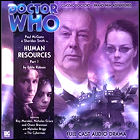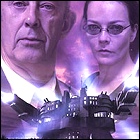 The Headhunter has finally gotten Lucie and puts her to work…in an office. Of course, it’s in Telford and she thought she was going to work in London, but it’s a nice enough place and she settles in quickly, having easily gotten over her dreams of travelling through time. Meanwhile, the Doctor finds that his TARDIS won’t work without Lucie (handiwork of the Time Lords) and accepts a time ring as a means to locating her. But Lucie is already finding trouble and even once she gets her memory back via the Doctor, she can’t keep from getting fired. As this involves her finding herself in the middle of an alien jungle during major hostilities, its hardly back to the dole queue on Monday. When the Doctor learns the sinister truth behind the “company” for whom Lucie was working, he tries to throw a spanner in the works only to be thrown himself by who is trying to do business with them. They’re a group with whom the Doctor has had plenty of experience and they give new meaning to the term “hostile takeover”.
The Headhunter has finally gotten Lucie and puts her to work…in an office. Of course, it’s in Telford and she thought she was going to work in London, but it’s a nice enough place and she settles in quickly, having easily gotten over her dreams of travelling through time. Meanwhile, the Doctor finds that his TARDIS won’t work without Lucie (handiwork of the Time Lords) and accepts a time ring as a means to locating her. But Lucie is already finding trouble and even once she gets her memory back via the Doctor, she can’t keep from getting fired. As this involves her finding herself in the middle of an alien jungle during major hostilities, its hardly back to the dole queue on Monday. When the Doctor learns the sinister truth behind the “company” for whom Lucie was working, he tries to throw a spanner in the works only to be thrown himself by who is trying to do business with them. They’re a group with whom the Doctor has had plenty of experience and they give new meaning to the term “hostile takeover”.
written by Eddie Robson
directed by Nicholas Briggs
music by ERSCast: Paul McGann (The Doctor), Sheridan Smith (Lucie Miller), Katarina Olsson (Headhunter), Roy Marsden (Hulbert), Nickolas Grace (Straxus), Owen Brenman (Jerry), Louise Fullerton (Karen), Andrew Wisher (Malcolm), Nicholas Briggs (Cybermen)
Notes: Roy Marsden later appeared in the 2007 TV story Smith And Jones.
Timeline: after No More Lies and before Human Resources Part 2
LogBook entry & review by Philip R. Frey
Review: The first part of Human Resources gets off to a poor start with some startlingly creaky dialogue. Lucie being oriented to the company has a large quantity of phony  “banter” that never rings true. Of course, given the duplicitous nature of the company, this can actually be explained away. Not so the lousy conversation between the Doctor and a nameless Time Lord. It’s as if the writer had never seen a proper Time Lord story before. It’s not what the Time Lord does that’s the problem. We’ve seen them be complete bastards before. But it’s the flippant nature of his attitude that feels wrong. We’ve seen them haughty, standoffish, conniving, or diplomatic. None of that here. Just a “Hey, Doctor! Here’s a time ring! Good luck!” They could have cut the whole scene and explained it’s events later and it would have worked better. (It would have made the Doctor’s appearance at the company more effective, too.)
“banter” that never rings true. Of course, given the duplicitous nature of the company, this can actually be explained away. Not so the lousy conversation between the Doctor and a nameless Time Lord. It’s as if the writer had never seen a proper Time Lord story before. It’s not what the Time Lord does that’s the problem. We’ve seen them be complete bastards before. But it’s the flippant nature of his attitude that feels wrong. We’ve seen them haughty, standoffish, conniving, or diplomatic. None of that here. Just a “Hey, Doctor! Here’s a time ring! Good luck!” They could have cut the whole scene and explained it’s events later and it would have worked better. (It would have made the Doctor’s appearance at the company more effective, too.)
Luckily, once the intros are over and the story kicks in, it’s pretty darned good. The premise of the weapon-of-mass-destruction-as-corporate-office is neat in and of itself, but it is the interpersonal that keeps things moving. Although the lengthy exposition by the company’s owner is clearly just an info dump, by portraying it as a sales pitch, it never feels like one. And the questions of who is hiring the company and why Lucie is so important keeps the listener wondering until the main villains finally show up in a strong close to the episode.
The setup of part one has shown that there are still some pretty original ideas out there and that even old villains can be used effectively, no matter how many times we’ve seen them before. So far, this one seems a bit stronger than the series’ opening two-parter Blood Of The Daleks. The next episode will tell whether it can conclude stronger, as well.
